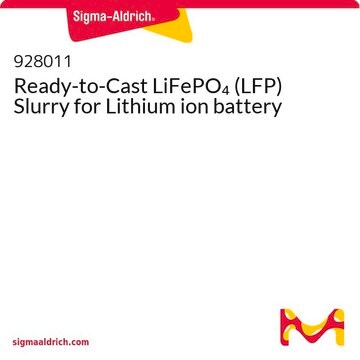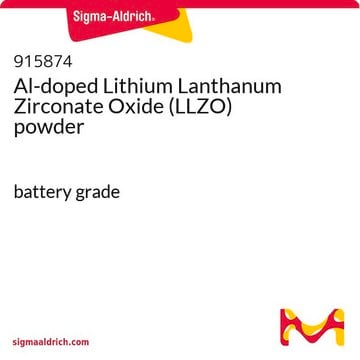759546
Lithium iron(II) phosphate
powder, <5 μm particle size (BET), >97% (XRF)
Synonyma:
Ferrous lithium phosphate, Iron lithium phosphate, LFP, Triphylite
About This Item
Doporučené produkty
grade
battery grade
assay
>97% (XRF)
form
powder
mol wt
Mw 157.76 g/mol
composition
LiFePO4
greener alternative product characteristics
Design for Energy Efficiency
Learn more about the Principles of Green Chemistry.
sustainability
Greener Alternative Product
particle size
<5 μm (BET)
mp
>300 °C (lit.)
density
3.6 g/cm3 (lit.)
application(s)
battery manufacturing
greener alternative category
InChI
1S/Fe.Li.H3O4P/c;;1-5(2,3)4/h;;(H3,1,2,3,4)/q+2;+1;/p-3
InChI key
GELKBWJHTRAYNV-UHFFFAOYSA-K
Hledáte podobné produkty? Navštivte Průvodce porovnáváním produktů
Související kategorie
General description
Application
Features and Benefits
✔ Achieves 1000s of cycles
✔ Safer than cobalt or manganese-based cathode materials
✔ Reliable performance
Legal Information
Related product
Storage Class
11 - Combustible Solids
wgk_germany
WGK 1
flash_point_f
Not applicable
flash_point_c
Not applicable
Osvědčení o analýze (COA)
Vyhledejte osvědčení Osvědčení o analýze (COA) zadáním čísla šarže/dávky těchto produktů. Čísla šarže a dávky lze nalézt na štítku produktu za slovy „Lot“ nebo „Batch“.
Již tento produkt vlastníte?
Dokumenty související s produkty, které jste v minulosti zakoupili, byly za účelem usnadnění shromážděny ve vaší Knihovně dokumentů.
Zákazníci si také prohlíželi
Sortimentní položky
Professor Qiao's review explores stable microstructures for lithium metal fluoride batteries, advancing energy storage technologies.
Solid oxide fuel cells and electrolyzers show potential for chemical-to-electrical energy conversion, despite early development stages.
Li-ion batteries are currently the focus of numerous research efforts with applications designed to reduce carbon-based emissions and improve energy storage capabilities.
Lithium-ion batteries offer high energy density and cyclic performance for portable electronic devices.
Náš tým vědeckých pracovníků má zkušenosti ve všech oblastech výzkumu, včetně přírodních věd, materiálových věd, chemické syntézy, chromatografie, analytiky a mnoha dalších..
Obraťte se na technický servis.












